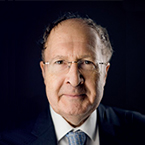
For Nobel Prize-winning scientific breakthroughs including the development of the first humanized antibodies, for establishment of refined phage display technology that has led to the development of adalimumab, the first marketed fully human antibody approved by the FDA, and for collective contributions to the generation of therapeutic antibodies for the treatment of various cancers and autoimmune diseases.
An internationally lauded pioneer of protein engineering, Dr. Winter’s research led to the development of both humanized and fully human therapeutic antibodies for treatment of cancer and immune inflammatory disease. His work on humanized antibodies provided a solution to the problem that rodent antibodies invariably provoked a blocking (and sometimes life-threatening) antibody response in patients. Dr Winter circumvented the issue by the genetic engineering of “humanized” antibodies, in which the antigen-binding regions from the rodent antibodies were transplanted into human antibodies. The engineered antibodies were largely human in sequence, and proved much less immunogenic than rodent antibodies in patients. This technology was widely applied, and is harnessed, for example, in the antibodies trastuzumab, bevacizumab and pembolizumab, for treatment of cancer.
Dr. Winter is also celebrated for his application of phage display technology for the generation of fully human antibodies. This work has led to several therapeutic antibodies, including adalimumab, the first fully human antibody approved for marketing by the US Food and Drug Administration (FDA). Dr Winter’s work in this area started with the isolation of antibody genes from lymphocytes, and their expression as antibody fragments in bacteria. To identify fragments with desired antigen-binding activities, Dr Winter and colleagues fused the antibody genes to a bacteriophage coat protein, leading to the display of the encoded antibody fragments on the phage surface. For the isolation of human antibodies against human self-antigens, as required for cancer therapy, they deployed very large and highly diverse libraries of antibody genes harvested from human lymphocytes, or as created from synthetic genetic building blocks. The binding affinities of the phage antibodies could be improved by sequential rounds of mutagenesis and increasingly stringent selection. The antibody genes were then isolated from the phage binders, and rebuilt into complete antibodies for development as pharmaceuticals. In 2018, Dr Winter shared the Nobel Prize in Chemistry with George Smith for “the phage display of peptides and antibodies.”
Selected Awards and Honors
2018 Nobel Prize in Chemistry, Royal Swedish Academy of Sciences, Stockholm, Sweden
2011 Royal Medal, The Royal Society, London, United Kingdom
2006 Elected Fellow, Academy of Medical Sciences, London, United Kingdom
2004 Knight Bachelor of the British Empire, New Year’s Honours List, London, United Kingdom
1999 William B. Coley Award for Distinguished Research in Basic and Tumor Immunology, Cancer Research Institute, New York, New York
1997 Commander of the Most Excellent Order of the British Empire, London, United Kingdom
1995 King Faisal International Prize for Science, King Faisal Foundation, Riyadh, Saudi Arabia
1994 Scheele Award, Swedish Academy of Pharmaceutical Sciences, Stockholm, Sweden
1990 Elected Fellow, The Royal Society, London, United Kingdom
1986 Colworth Medal, Biochemical Society, London, United Kingdom
[Institutional affiliations listed for Fellows reflect those held at the time of their induction into the AACR Academy.]